Taking down a tarnished icon
推倒一个“变质”的偶像
THE NEWS THAT AUNG SAN SUU KYI HAD BEEN overthrown in a coup spread through Myanmar like a shock wave. "Most of the citizens 100% depend on her," says Kyaw Kyaw, a 28-year-old LGBTQ activist who lives in Yangon, the Southeast Asian nation's largest city. "Everyone was frustrated and scared."
昂山素季在政变中被推翻的消息像冲击波一样在缅甸传开。住在缅甸最大城市仰光的28岁LGBTQ激进分子觉觉说:“大多数市民都是100%仰仗她,大家都感到沮丧和害怕。”
Myanmar's de facto leader was idolized even before she came to office. During the 15 years that the junta kept her under house arrest, many secretly kept pictures of Suu Kyi in their homes. After her release, her party, the National League for Democracy (NLD), won elections in 2015, ending decades of military rule. The country's struggle for democracy has always centered on Suu Kyi. Now that the military has her in detention again—reportedly facing trumped-up charges of violating import-export laws—there are few capable of uniting resistance to the generals' emergency rule. "When she disappeared, nobody knew what to do," says Kyaw Kyaw.
这位缅甸实际上的领导人甚至在她上台之前就被奉为偶像。在军政府软禁昂山素季的15年时间里,许多人在家中秘密保存了她的照片。在她获释后,她的政党全国民主联盟(NLD)在2015年赢得了选举,结束了数十年的军事统治。缅甸争取民主的斗争一直以昂山素季为中心。现在,军方再次拘留了她——据报道,她面临着捏造的违反进出口法的指控——几乎没有人有能力联合起来抵抗将军们的紧急统治。“她消失后,没人知道该怎么办,”觉觉说。

The truth is that the military never really lost control. Despite the reforms of recent years, the Tatmadaw—as the army is officially known— retained control of key ministries. A 2008 constitution guaranteed it 25% of the seats in parliament and a veto over any constitutional amendment.
事实上,军队从未真正失去控制。尽管近年来进行了改革,缅甸军队(军队的官方名称)仍然控制着关键部门。2008年的宪法保证了它在议会中拥有25%的席位和对任何宪法修正案的否决权。
But the NLD's resounding victory in a Nov. 8 election, claiming over 80% of the vote, was too much democracy for the generals to bear. The military claimed widespread fraud and has now declared emergency rule until the election can be run again. It is not clear what form that vote will take. How far the military goes will hinge on how compliant civilian leaders are and the scale of popular resistance, says Dan Slater, director of the Weiser Center for Emerging Democracies at the University of Michigan. But the political future of the country's most prominent leader looks uncertain at best, he says. "Banning Aung San Suu Kyi could very well be one of the military's main wishes or demands."
但是全国民主联盟在11月8日的选举中取得了压倒性的胜利,宣称获得了超过80%的选票,这对将军们来说太过民主,难以承受。军方声称存在普遍舞弊现象,并宣布进入紧急状态,直到再次举行选举。目前还不清楚这次投票将采取何种形式。密歇根大学威瑟新兴民主中心主任斯莱特说,军方能走多远将取决于平民领导人的顺从程度和民众抵抗的规模。但他说,但是这个国家最杰出的领导人的政治前途看起来不确定,“给昂山素季下禁令很可能是军方的主要愿望或要求之一。”
THE WOMAN ONCE CALLED a "beacon of hope" by President Barack Obama won the Nobel Peace Prize in 1991 for her nonviolent resistance against the junta. After her release in 2010, she became an even greater icon of human rights, mentioned in the same breath as Gandhi or Mandela. With the help of the U.S. and other nations loosening economic sanctions, she helped usher her country through a series of reforms, including the historic 2015 vote.
这位曾被奥巴马总统称为“希望的灯塔”的妇女因非暴力抵抗军政府而在1991年获得了诺贝尔和平奖。2010年获释后,她成为更伟大的人权偶像,和甘地、曼德拉平起平坐。在美国和其他国家放松经济制裁的帮助下,她帮助自己的国家通过了一系列改革,包括2015年的那次历史性投票。
译文由可可原创,仅供学习交流使用,未经许可请勿转载。












